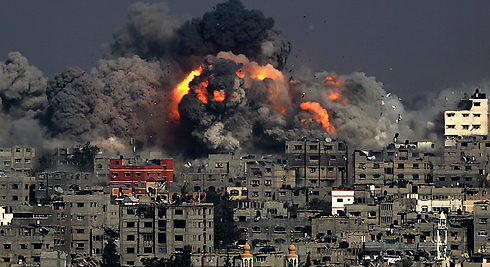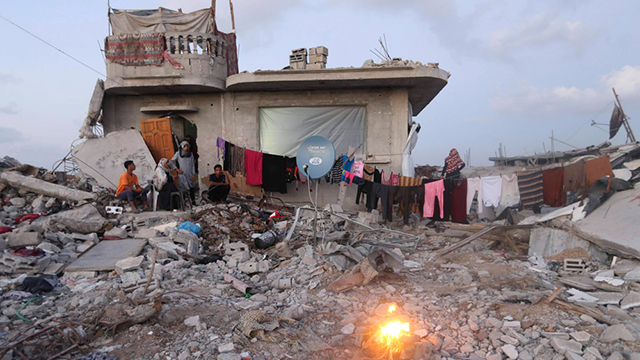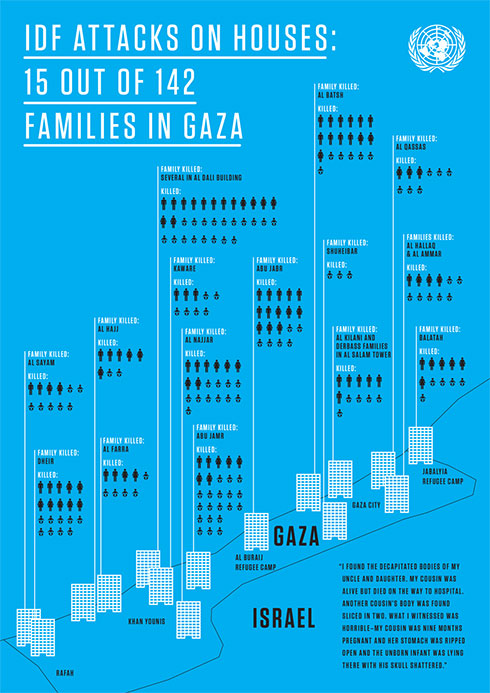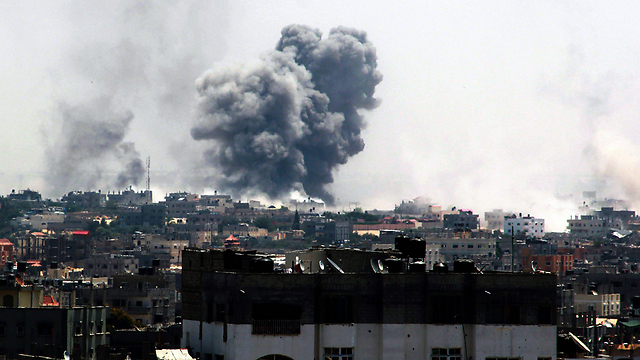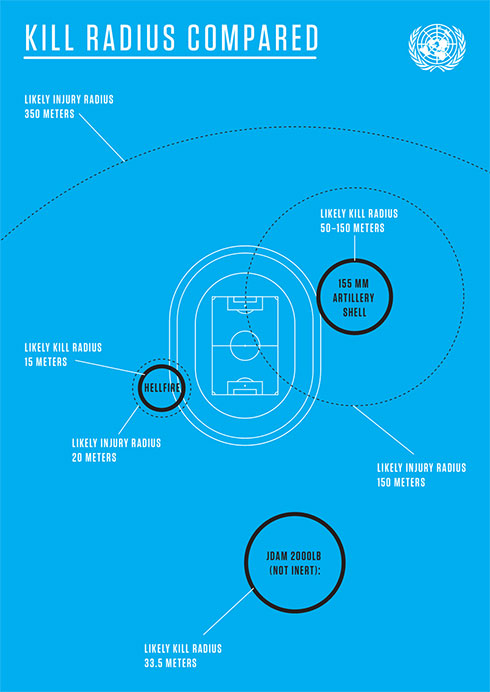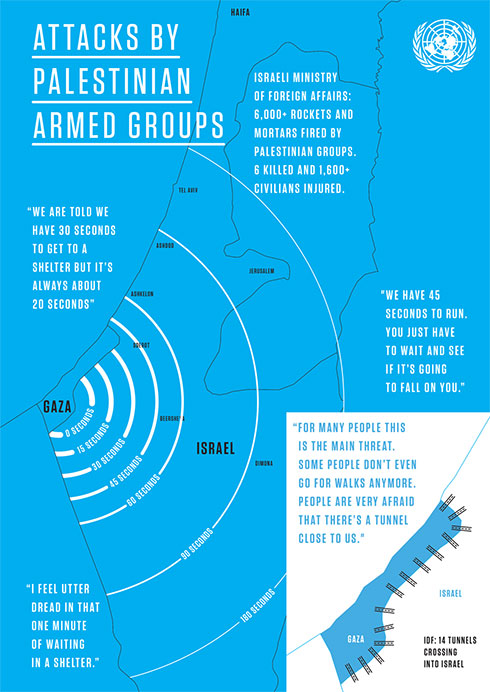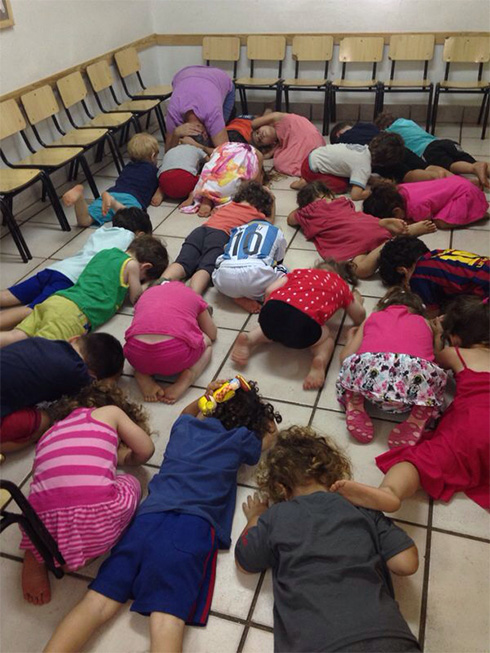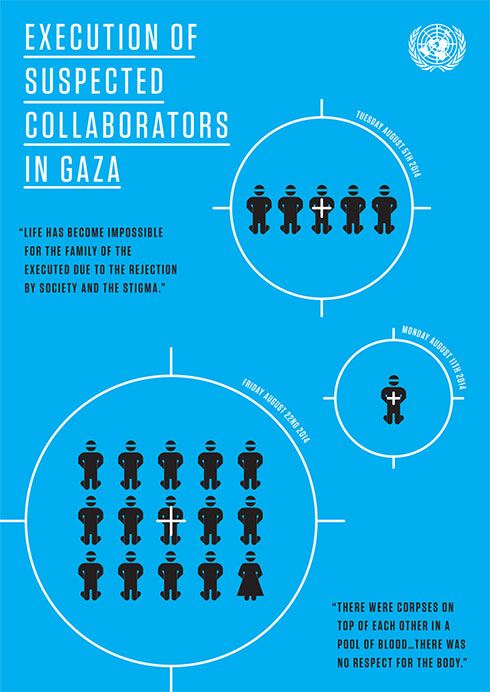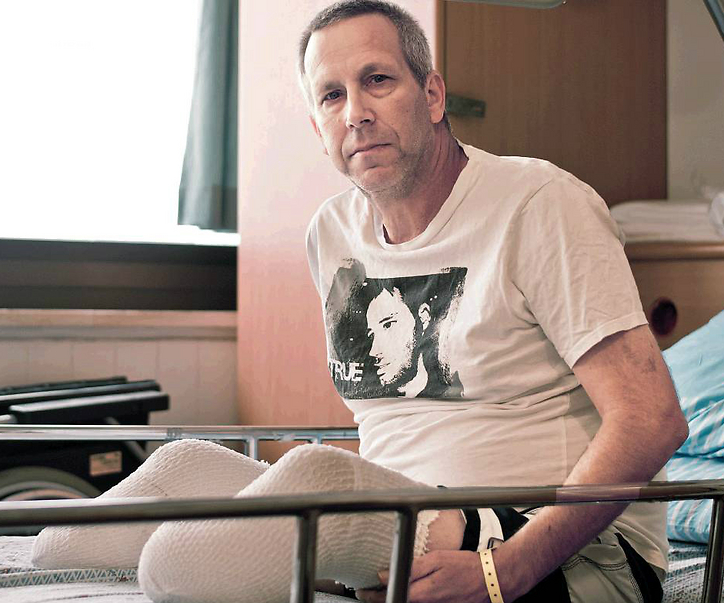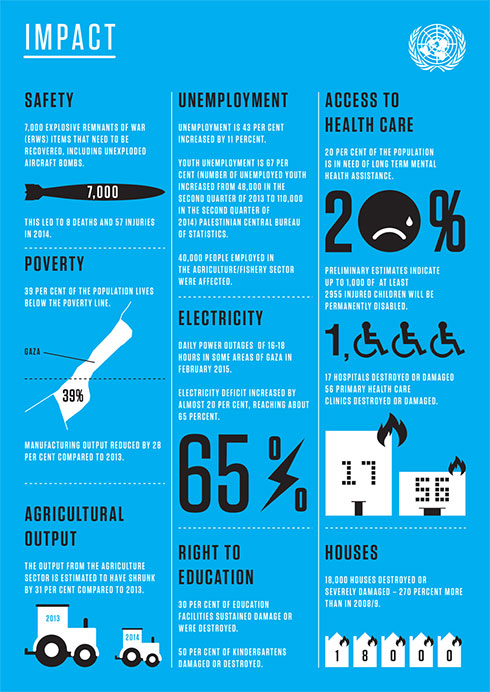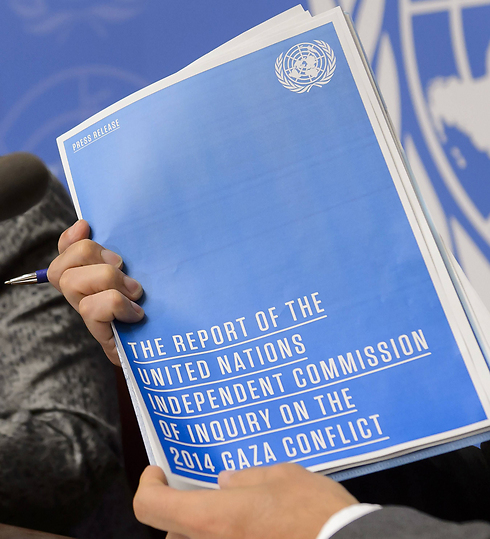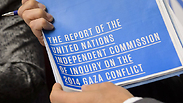
UN report calls for international investigation into alleged Israel, Hamas war crimes
UNHRC commission determines one third of Gaza dead during Protective Edge were children, while noting effect 'indiscriminate rocket fire' had on Israeli civilians.
The United Nation's international investigation commission on Monday accused both Israel and the Palestinian terror organizations in the Gaza Strip of grave abuses of international humanitarian law during Operation Protective Edge last summer that may amount to war crimes in a report dismissed by Israel as "biased."
The commission, led by former judge Mary McGowan Davis, called on all sides to cooperate with the International Criminal Court (ICC), which has opened a separate preliminary investigation.
"The most that we can hope for out of this long and arduous process of inquiry is that we will push the ball of justice a little further down the field," McGowan Davis told a news conference at the UN Human Rights Commission headquarters in Geneva on Monday.
The war started July 8, 2014, after the kidnapping and killing of three Israeli teenagers in the West Bank, as well as the subsequent kidnapping and burning alive of a Palestinian teenager in an apparent revenge attack. Israel responded to the teens' kidnapping by arresting hundreds of Hamas members in raids in the West Bank, prompting militant groups in Gaza to step up their rocket attacks.
A ceasefire last August ended 50 days of fighting between Gaza militants and Israel in which health officials said more than 2,100 Palestinians, mostly civilians, were killed. Israel put the number of its dead at 67 soldiers and six civilians.
Israeli air strikes and shelling hammered the densely-populated Gaza Strip dominated by the Islamist Hamas movement, causing widespread destruction of homes and schools.
Hamas and other militant groups launched thousands of rockets and mortar bombs out of the enclave into Israel.
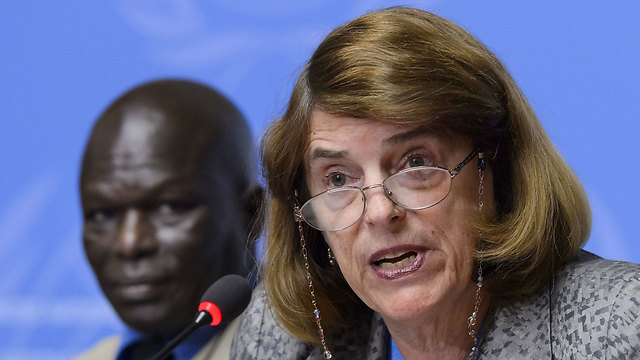
"The (UN) commission was able to gather substantial information pointing to serious violations of international humanitarian law and international human rights law by Israel and by Palestinian armed groups. In some cases, these violations may amount to war crimes," the independent investigators said in a report issued on Monday following a year-long inquiry.
“The extent of the devastation and human suffering in Gaza was unprecedented and will impact generations to come," McGowan Davis said.
Buildings turned into piles of dust
Palestinians have said that the IDF violated the rules of war, which include giving adequate warning to civilians, using proportionate force and distinguishing between civilians and combatants. They have pointed to the high civilian casualty count as evidence.
Israel claims that Hamas is responsible for the civilian casualties because it used Gaza's residents as "human shields" by firing rockets from residential areas and operating in schools, hospitals and mosques. It also notes that Hamas' rockets and mortar shells were aimed at Israeli population centers.
The report states that the summer 2014 hostilities saw a huge increase in firepower used in Gaza, with more than 6,000 airstrikes by Israel and approximately 50,000 tank and artillery shells fired. During the 50-day operation, 1,462 Palestinian civilians were killed, a third of them children, commission members claimed.
The bombings of residential buildings had especially dire consequences, wiping out entire families, with 551 children killed, a choked-up McGowan Davis told reporters in Geneva.
Hundreds of Palestinian civilians were killed in their homes, mainly women and children, the report notes. Witnesses and survivors of these bombings described airstrikes that turned houses into piles of dust and ash in mere seconds.
The report quotes a member of the A-Najar family, 19 members of which were killed in an airstrike in Khan Younis on June, 26. "I woke up at about six or so, in the hospital, and I later learned that my sister, my mother and my children had all died," he said. "We all died that day, even those who survived."
At least 142 families lost three or more members in attacks on residential buildings during the war, resulting in 742 deaths.
"There was an explosion about every 10 seconds," said a witness from Rafah during an intensive IDF bombardment on August 1, after fears emerged that a soldier was kidnapped.
McGowan Davis states in the report that when an Israeli soldier's life is on the line, it seems that rules are ignored.
"The fact that Israel did not revise its practice of air strikes, even after their dire effects on civilians became apparent, raises questions of whether this was part of a broader policy which was at least tacitly approved at the highest level of government," the commission said in a statement.
The commission expressed concern about Israel’s extensive use of weapons that have a wide kill and injury radius; though not illegal, their use in densely populated areas is highly likely to kill combatants and civilians indiscriminately.
Israel has argued that it took unprecedented measures to avoid civilian casualties, ordering residents to evacuate through leaflets, phone calls, radio broadcasts and warning strikes with unarmed shells ahead of live airstrikes.
However, the UN commission said that in many incidents "the weapons used, the timing of attacks, and the fact that the targets were located in densely populated areas indicate that the Israel Defense Forces may not have done everything feasible to avoid or limit civilian casualties."
Commission members say there appears to be a pattern whereby the IDF issued warnings to people to leave a neighborhood and then automatically considered anyone remaining to be a fighter. This practice, the commission says, makes attacks on civilians highly likely.
During the Israeli ground incursion into Gaza that began in mid-July 2014, hundreds of people were killed and thousands of homes destroyed or damaged. First aid centers reported that they received desperate calls for help from people in the Saja'iyya neighborhood in which children's screams could be heard.
Palestinian war crimes
The report further says Palestinian armed groups had fired 4,881 rockets and 1,753 mortar bombs, many toward major Israeli cities and towns, killing six civilians and injuring at least 1,600 others.
It cites "the inherently indiscriminate nature of most of the projectiles launched into Israel and (of) the targeting of civilians, which violate international humanitarian law and may amount to a war crime".
Speaking to the effect the constant rocket fire had to Israeli civilians, the reports states that "The hostilities also caused immense distress and disruption to the lives of civilians in Israel. Witnesses living near Gaza spoke of being disturbed by seeing the bombing from their sitting room windows but also struggled to reach shelters in time with their children when the sirens alerted them to incoming attacks. The indiscriminate firing of thousands of rockets and mortars at Israel appeared to have the intention of spreading terror among civilians there."
McGowan Davis said one Israeli woman had described the helplessness she felt when her grandchild pleaded with her to "stop the rockets".
"In addition, the Israeli military discovered 14 tunnels extending from Gaza into Israel that were used to attack their soldiers during this period. The idea of the tunnels traumatized Israeli civilians who feared they could be attacked at any moment by gunmen bursting out of the ground," the comission notes.
The independent investigators also condemn what they say had been executions of 21 alleged Palestinian "collaborators" with Israel by militants in Gaza, saying these killings appeared to constitute war crimes and calling on the Palestinians to hold those behind the executions accountable.
'Impunity across the board'
While the conflict has ended, McGowan Davis pointed to a "pervasive failure on all sides to achieve justice" for the wrongs committed, and the report urges Israel to "break with its recent lamentable track record in holding wrongdoers accountable," noting that “accountability on the Palestinian side is also woefully inadequate."
"The commission is concerned that impunity prevails across the board for violations of international humanitarian law and international human rights law allegedly committed by Israeli forces..." it says in the report.
"Israel has failed to hold accountable those responsible for alleged grave violations of international humanitarian and human rights law resulting from IDF actions during recent past active hostilities in Gaza," the report notes.
"The commission is disturbed by Israel’s decision to close its criminal investigation into the case of the killing of four children on the beach in Gaza on 16 July 2014. International journalists and many Palestinian eyewitnesses do not appear to have been interviewed by the Israeli authorities, which raises questions about the thoroughness of their investigation," the report states.
No Israeli cooperation
The commission criticizes Israeli authorities for failing to respond to repeated requests by for information and direct access to Israel and to Palestinian territories.
Israel, the report states, has not released sufficient information for investigating the motives for its strikes in Gaza. "Information currently made available is very welcome, but is insufficient to allow for effective public and international scrutiny," the commission says.
While the Israeli government refused to cooperate with the commission, its members obtained harrowing first hand testimony by means of Skype, VTC and telephone interviews. It also conducted face-to-face interviews with victims and witnesses from the West Bank during two visits to Jordan and spoke to victims and witnesses from Israel who travelled to Geneva.
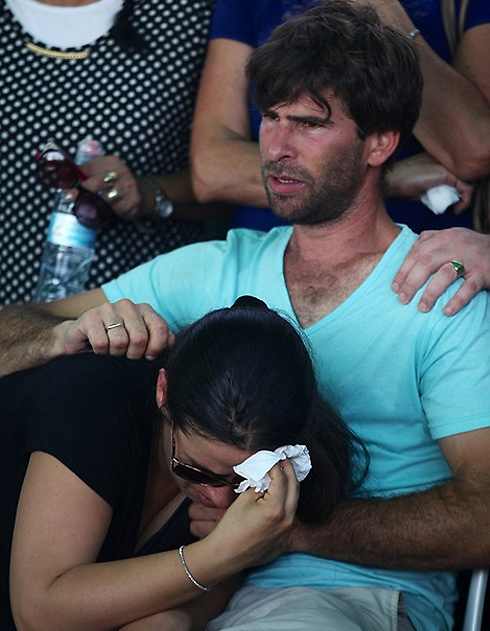
Among the Israelis to testify in front of the commission were MK Haim Yellin, who was the head of the Eshkol Regional Council during the war; Gila Tregerman, the mother of four-year-old Daniel, who was killed in a mortar attack; and Gadi Yarkoni, who lost his legs in a mortar attack. Israeli NGOs and human rights organizations also submitted files representing Israel's side.
The commission conducted more than 280 confidential interviews and received some 500 written submissions.
“We were deeply moved by the immense suffering and resilience of the victims,” the commissioners note, “we just hope our report contributes in some small way to ending the cycle of violence."
While Israel refused to cooperate with the commission, its members say they received full cooperation from Palestinian officials, including the Palestinian observer in the UN. The commission met with representatives of the Palestinian government in Amman, as well as representatives from Gaza with written statements. The commission sent both the Israeli and Palestinian governments a list of questions regarding specific incidents, legal matters, and policy. A question list was also sent to Hamas, however only the Palestinian government answered.
'Investigate international violations'
In the recommendations portion of the report, the commission laments "The persistent lack of implementation of recommendations – made by previous commissions of inquiry, fact-finding missions, United Nations treaty bodies, special procedures and other United Nations bodies."
The commission also calls upon all parties to respect international law, and cooperate fully with the International Criminal Court, while calling on Israelis and Palestinians to demonstrate political leadership.
The commission additionally calls on the Israeli government to conduct a thorough, transparent, objective and credible review of policies governing military operations and of law enforcement activities in the Palestinian territories, as defined by political and military decision-makers, to ensure compliance with international law, specifically in regards to the use of high powered explosives in populated areas, defining military targets, the tactic of targeting high rises, improving warnings to civilians before strikes, and the protection of citizens when invoking the Hannibal Directive.
The investigators also call on Israel to explain its "targeting decisions" to allow independent assessment of its attacks on Gaza Strip.
Furthermore, the report asserts that Israel must end its blockade of Gaza, halt settlement building, and implement the advisory opinion rendered on July 9, 2004 by the International Court of Justice on the legal consequences of the construction of the separation wall in the Palestinian territories.
The commission later calls upon the "State of Palestine" (the way the commission refers to the Palestinian side in the report) to "ensure the investigations into violations of international law by the Palestinian Authority, and Palestinian armed groups; to hasten the efforts to translate Palestinian unity declarations into tangible measures; to end all attacks and rocket fire on Israeli civilians, and stop summary executions and torture of Palestinians; and to cooperate with the Palestinian investigation which is meant to bring to justice those responsible for violations."
While the commission devotes a large portion of the report to the harming of Palestinian civilians by Israel, and states that "Palestinian armed factions often acted from within densely packed neighborhoods," there was no mention in the conclusions portion of the report of Hamas' use of civilians as human shields.
The report will only be officially presented to the United Nation's Human Rights Council in Geneva on June 29, 2015, but the commission sent it to both parties in advance.
Even before the report's unveiling, Israel's Military Advocate General decided to expand the IDF's criminal investigations against soldiers and officers suspected of committing violations during the conflict. The charges focus on three cases in addition to those already investigated by the commission, in which unlawful use of force by IDF forces is suspected.
The ICC prosecutor's office said Monday it was "taking cognisance of the (UN) report and will review it in the context of its ongoing preliminary examination," aimed at determining whether an investigation is warranted.
The UN investigators refused to say whether they thought the ICC was an appropriate forum for seeking accountability for the abuses committed during the 2014 Gaza conflict.
A resolution based on their report will likely be tabled at the Human Rights Council next week, but it remains unclear whether diplomats will be able to agree on what follow-up action is merited.
McGowan Davis said she hoped the report could help "push the ball of justice a little further down the field."
Yaron Druckman, Eyal Lehmann, Roi Kais, Elior Levy, Ron Notkin, Roi Simyoni, Reuters, The Associated Press and AFP contributed to this report.










